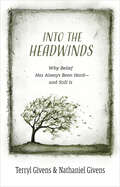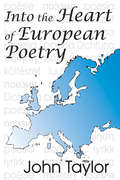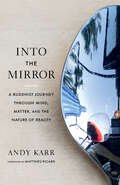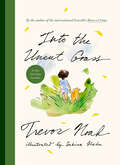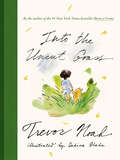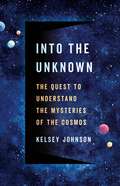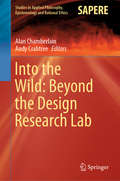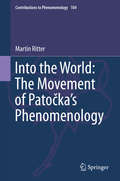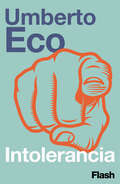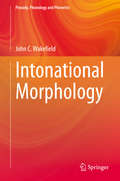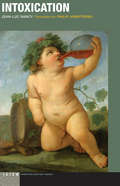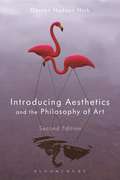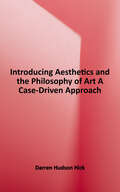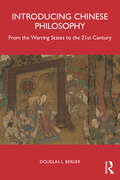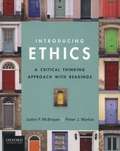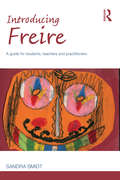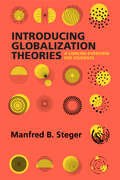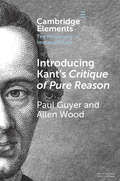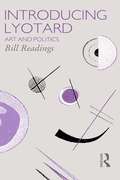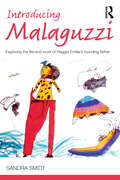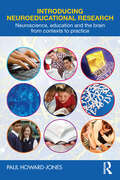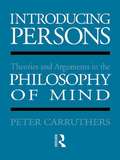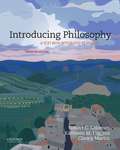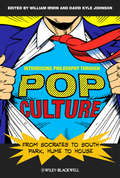- Table View
- List View
Into the Headwinds: Why Belief Has Always Been Hard—and Still Is
by Terryl Givens Nathaniel GivensA deeper look at how people individually and collectively form religious beliefs—and what that means for faith in a society of declining religious affiliation. Secularism is increasingly a fact of life in Western society. But that doesn&’t necessarily mean that faith is harder than it has been before. Even in the past when organized religion enjoyed more widespread cultural acceptance, there were still obstacles to true belief. Today, the obstacles are different, but faith is still viable. Acclaimed author Terryl Givens and his son, Nathaniel Givens, combine their respective areas of expertise to offer here a fresh take on religious belief through the lens of contemporary research on psychology, cognition, and human nature. They also address two of faith&’s foremost modern-day antagonists: rationalism—the myth that humans can or should make the majority of their choices based on logical thought—and scientism—the myth that science is the only reliable means of discovering truth. After reckoning with the surprising fact that people often don&’t even understand their own beliefs and are influenced in ways they seldom perceive, the authors go on to describe genuine faith as an act of will—an effortful response to the deepest yearnings of the mind and heart—that engenders moral responsibility, the ability to embrace uncertainty, the motivation and means to relate to others, and the capacity to apprehend reality through nonrational means. Written for truth seekers who may or may not belong to religious communities, Into the Headwinds is less a work of apologetics than an inquiry into the role that faith can and does still play in a society where participation in institutional religion is declining precipitously. Terryl and Nathaniel Givens propose that to reclaim the power of genuine faith—that which can truly offer a way of living against the grain—we need to first acknowledge the reality that religious belief is hard. It always has been, and it always will be. But perhaps, instead of a hindrance, that is its most important aspect.
Into the Heart of European Poetry
by John TaylorJohn Taylor's brilliant new book examines the work of many of the major poets who have deeply marked modern and contemporary European literature. Venturing far and wide from the France in which he has lived since the late 1970s, the polyglot writer-critic not only delves into the more widely translated literatures of Italy, Greece, Germany, and Austria, but also discovers impressive and overlooked work in Slovenia, Bosnia, Hungary, Finland, Norway, and the Netherlands in this book that ranges over nearly all of Europe, including Russia.While providing this stimulating and far-ranging critical panorama, Taylor brings to light key themes of European writing: the depth of everyday life, the quest of the thing-in-itself, metaphysical aspiration and anxiety, the dialectics of negativity and affirmation, subjectivity and self-effacement, and uprootedness as a category that is as ontological as it is geographical, historical, political, or cultural. The book pays careful attention to the intersection of writing and history (or politics), as several poets featured here have faced the Second World War, the Holocaust, Communism, the fall of Communism, or the war in the former Yugoslavia.Taylor gives the work of renowned, upcoming, and still little-known poets a thorough look, all the while scrutinizing recent translations of their verse. He highlights several poets who are also masters of the prose poem. He includes a few novelists who have fashioned a particularly original kind of poetic prose, that stylistic category that has proved so difficult for critics to define. Into the Heart of European Poetry should be of immediate interest to any reader curious about the aesthetic and philosophical ideas underlying major trends of contemporary European writing. In a day and age when much too little is translated and thus known about foreign literature, and when Europeans themselves are pondering the common denominators of their own culture, this book is a
Into the Mirror: A Buddhist Journey through Mind, Matter, and the Nature of Reality
by Andy KarrInto the Mirror examines the materialism of the modern world through the profound teachings of Mahayana Buddhism and offers an accessible and powerful method for investigating the way our minds construct our worlds.Into the Mirror combines contemporary Western inquiries into the nature of consciousness, with classical Buddhist investigations into the nature of mind, to offer deep insights into the nature of reality. Andy Karr invites the reader to make this a personal, experiential journey through study, contemplation, and meditation.The first part of the book presents the Mahayana Buddhist approach to the path of freedom from suffering. It explores foundational teachings, such as the four truths, the notion of enlightenment, and the practice of meditation, from a fresh perspective. The second part deconstructs assumptions about mind and the material world using easily understood tools from contemporary Western philosophy. Part three presents a series of contemplative practices, ethics, and insights, starting with the Middle Way teachings on emptiness and interdependence, through Yogachara&’s subtle understanding of non-duality, to the view that buddha nature is already within us to be revealed rather than something external to be acquired.Into the Mirror concludes with a call to cultivate compassion for beings and the environment right within this world of illusion.
Into the Uncut Grass
by Trevor NoahFrom the #1 New York Times bestselling author of Born a Crime comes a timeless illustrated story inviting people of all ages to connect with one another in a world brought to life with imagination. &“But sooner or later your mother will find us,&” Walter said, looking back at the house. &“She always does.&”The boy&’s eyes lit up again. He had an idea.&“Then this time we need to go where we&’ve never gone before,&” he said. &“Into the uncut grass!&” In the tradition of The Boy, the Mole, the Fox and the Horse comes a gorgeously illustrated fable about a young child&’s journey into the world beyond the shadow of home, a magical landscape where he discovers the secrets of sharing, connection, and finding peace with the people we love. Infused with the author&’s signature wit and imagination, in collaboration with visionary artist Sabina Hahn, it&’s a tale for readers of all ages—to be read aloud or read alone.
Into the Uncut Grass
by Trevor NoahA story for all ages from the author of the #1 bestselling Born a Crime &“What will we find in the uncut grass?&”&“It depends on what we&’re looking for.&”In the tradition of The Boy, the Mole, the Fox and the Horse comes a gorgeously illustrated fable about a young child&’s journey into the world beyond the shadow of home, a magical landscape where he discovers the secrets of solidarity, connection, and finding peace with the people we love. Infused with the author&’s signature wit and imagination, in collaboration with masterful artist Sabina Hahn, it&’s a tale for readers of all ages—to be read aloud or read alone.
Into the Unknown: The Quest to Understand the Mysteries of the Cosmos
by Kelsey JohnsonA leading astronomer and gifted teacher takes readers on a wondrous tour—"perfect for anyone who enjoyed Astrophysics for People in a Hurry" (Publishers Weekly)—of how science confronts the big questions about the origins, destiny, and fundamental nature of our universe Humans have learned a lot about the world around us and the universe beyond. We have made powerful insights and created profound theories about the universe and everything in it. Surely the ultimate theory must be waiting, just beyond our current knowledge. Well, maybe. In Into the Unknown, astrophysicist Kelsey Johnson takes us to the edge of scientific understanding about the universe: What caused the Big Bang? What happens inside black holes? Are there other dimensions? She doesn&’t just celebrate what we know but rather what we don&’t, and asks what it means if we never find that knowledge. Exploring the convergence of science, philosophy, and theology, Johnson argues we must reckon with possibilities—including those that may be beyond human comprehension. The very places where we run smack into total ignorance are the places where the most important questions—about the philosophy of knowledge, the nature of our cosmos, and even the existence of God—await. As accessible as it is profound, Into the Unknown invites each of us to join in the great quest for knowledge.
Into the Wild: Beyond the Design Research Lab (Studies in Applied Philosophy, Epistemology and Rational Ethics #48)
by Andy Crabtree Alan ChamberlainThis edited collection opens up new intellectual territories and articulates the ways in which academics are theorising and practicing new forms of research in ‘wild’ contexts. Many researchers are choosing to leave the familiarity of their laboratory-based settings in order to pursue in-situ studies ‘in the wild’ that can help them to better understand the implications of their work in real-world settings. This has naturally led to ethical, philosophical and practical reappraisals with regard to the taken for granted lab-based modus operandi of scientific, cultural and design-based ways of working. This evolving movement has led to a series of critical debates opening up around the nature of research in the wild, but up until now these debates have not been drawn together in a coherent way that could be useful in an academic context. The book brings together applied, methodological and theoretical perspectives relating to this subject area, and provides a platform and a source of reference material for researchers, students and academics to base their work on. Cutting across multiple disciplines relating to philosophy, sociology, ethnography, design, human–computer interaction, science, history and critical theory, this timely collection appeals to a broad range of academics in varying fields of research.
Into the World: The Movement of Patočka's Phenomenology (Contributions to Phenomenology #104)
by Martin RitterCritically evaluating and synthesizing all the previous research on the phenomenology of Czech philosopher Jan Patočka, the book brings a new voice into contemporary philosophical discussions. It elucidates the development of Patočka’s phenomenology and offers a critical appropriation of his work by connecting it with non-phenomenological approaches.The first half of the book offers a succinct, and systematizing, overview of Patočka’s phenomenology throughout its development to help readers appreciate the motives behind and grounds for its transformations. The second half systematically explicates, critically examines and creatively develops Patočka’s concept of the movement of existence as the most promising part of his asubjective phenomenology.The book appeals to new readers of Patočka as well as his scholars, and to students and researchers of contemporary philosophy concerned with topics such as embodiment, personal identity, intersubjectivity, sociality, or historicity. By re-assessing Patočka’s philosophy of history and his civilizational analysis, it also helps to better articulate the question of the place of Europe in the post-European world.
Intolerancia
by Umberto EcoEl gran Umberto Eco disecciona la naturaleza incorregible de la intolerancia.«[...] cuando la intolerancia se convierte en doctrina es demasiado tarde para combatirla, y los que deberían hacerlo se convierten en sus primeras víctimas.»Si algo sabe hacer Umberto Eco es hablar con la claridad y la autoridad de los grandes pensadores. En este texto se propone diseccionar sucintamente la esencia de toda intolerancia. Con una evidente lucidez, Eco sitúa el origen de esta lacra en el miedo y el desconocimiento de lo que es diferente. Si algo deja claro es que existe una intolerancia salvaje muy difícil de corregir y que solo educando desde la más temprana infancia es posible intentar erradicarla. Unas pocas palabras de Umberto Eco bastan para que miremos el mundo con ojos nuevos. Críticas:«La figura de Umberto Eco es tanto mayor cuanto más tiempo pasa.»Vicente Verdú, El País«Umberto Eco cambió nuestra mirada sobre los libros: imprescindibles, pequeños, frágiles, a veces criminales, casi siempre salvadores. Un maestro que nos enseñó a entrelazar la sabiduría y el juego con su estilo sagaz y lúdico, con su asombrosa inventiva y certera lucidez.»Irene Vallejo«Un sabio que sabía todas las cosas simulando que las ignoraba para seguir estudiando.»Juan Cruz, El País«La figura de Umberto Eco es tanto mayor cuanto más tiempo pasa.»Vicente Verdú, El País«Laliteratura de Umberto Eco es un bombardeo indiscriminado que no respeta ningún protocolo de guerra.»El Cultural«Umberto Eco disecciona el mal.»La Razón«Un humanista integral.»Fernando Savater«Un genio inagotable, voraz, que construye y deconstruye sin cesar, de inteligencia deslumbrante y humorística cuando hace falta.»Mercedes Monmany, ABC«Uno de los pensadores más influyentes de nuestro tiempo.»Los Angeles Times«Umberto Eco era un hombre libre, dotado de un profundo espíritu crítico y de una gran pasión cívica. [...] Observador agudo y desencantado, sus novelas y ensayos han aportadoprestigioa Italia y ha enriquecido la cultura en todas sus latitudes.»Sergio Mattarella, presidente de la República de Italia«Una de las mentes más brillantes de Italia.»Library Journal
Intonational Morphology (Prosody, Phonology and Phonetics)
by John C. WakefieldThis book discusses the morphological properties of intonation, building on past research to support the long-recognized relationship between the functions and meanings of discourse particles and the functions and meanings of intonation. The morphological status of intonation has been debated for decades, and this book provides evidence from the literature combined with new and compelling empirical evidence to show that specific intonational forms correspond to specific segmental discourse particles. Based on the conclusion that intonation is in the lexicon, it proposes syntactic positions for intonational meanings using a cartographic approach. It also describes how intonation is represented in speakers' minds, which has important implications for first and second language acquisition as well as for theories and approaches to artificial speech recognition and production. This book is of interest to theoretical and applied linguists, as well as to anyone whose research and interests relate in any way to intonation.
Intoxication (Idiom: Inventing Writing Theory)
by Jean-Luc NancyFrom Plato’s Symposium to Hegel’s truth as a “Bacchanalian revel,” from the Bacchae of Euripedes to Nietzsche, philosophy holds a deeply ambivalent relation to the pleasures of intoxication. At the same time, from Baudelaire to Lowry, from Proust to Dostoyevsky, literature and poetry are also haunted by scenes of intoxication, as if philosophy and literature share a theme that announces and navigates their proximities and differences.For Nancy, intoxication constitutes an excess that both fascinates and questions philosophy’s sober ambitions for appropriate forms of philosophical behavior and conceptual lucidity. At the same time, intoxication displaces a number of established dualities—reason and passion, mind and body, rationality and desire, rigor and excess, clarity and confusion, logic and eros.Taking its point of departure from Baudelaire’s categorical imperative to understand modernity—“be drunk always”—Nancy’s little book is composed in fragments, quotations, drunken asides, and inebriated repetitions. His contemporary “banquet” addresses a range of related themes, including the role of alcohol and intoxication in rituals, myths, divine sacrifice, and religious symbolism, all those toasts to the sacred “spirits” involving libations and different forms of speech and enunciation—to the gods, to modernity, to the Absolute. Affecting both mind and body, Nancy’s subject becomes intoxicated: Ego sum, ego existo ebrius—I am, I exist—drunk.
Introducing Aesthetics and the Philosophy of Art (2nd Edition)
by Darren Hudson Hick<p><i>Introducing Aesthetics and the Philosophy of Art</i> is written to introduce students to a broad array of questions that have occupied philosophers since antiquity, and which continue to bother us today-questions like: <p> <li>Is there something special about something's being art? Can a mass-produced plastic bird have that special something? <li>If someone likes plastic pink flamingos, does that mean they have bad taste? Is bad taste a bad thing? <li>Do Featherstone's pink flamingos mean anything? If so, does that depend on what Featherstone meant in designing them?</li> <p> <p>Each chapter opens using a real world example - such as Marcel Duchamp's signed urinal, The Exorcist, and the ugliest animal in the world - to introduce and illustrate the issues under discussion. These case studies serve as touchstones throughout the chapter, keeping the concepts grounded and relatable. <p>With its trademark conversational style, clear explanations, and wealth of supporting features, Introducing Aesthetics and the Philosophy of Art is the ideal introduction to the major problems, issues, and debates in the field. Now expanded and revised for its second edition, <i>Introducing Aesthetics and the Philosophy of Art</i> is designed to give readers the background and the tools necessary to begin asking and answering the most intriguing questions about art and beauty, even when those questions are about pink plastic flamingos.</p>
Introducing Aesthetics and the Philosophy of Art: A Case-Driven Approach, Third Edition
by Darren Hudson HickAesthetics and the philosophy of art are about things in the world – things like the Mona Lisa, but also things like horror movies, things like the ugliest dog in the world, and things like wallpaper. There’s a surprising amount of philosophical content to be found in wallpaper. Using a case-driven approach, Introducing Aesthetics and the Philosophy of Art is grounded in real-world examples that propel thought, debate, and discussion about the nature of art and beauty. Now in its third edition, this tried-and-tested text features fresh cases and new activities. Hands-on Do Aesthetics! activities pepper the text, and Challenge Cases appear at the end of each chapter to test intuitions, complicate the field of discussion, and set a path forward. Charlotte Perkins Gilman’s “The Yellow Wall-Paper” serves as a recurring case throughout, and this edition includes the full text of this classic short story. From classical debates that continue to bother philosophers today, to emerging problems of identity, appropriation, and morality, this introduction is designed to engage you in a field that itself engages with so much of the world around you. Here is everything you need to know about the history, themes, thinkers, and theories to get you started on aesthetics and the philosophy of art.
Introducing Chinese Philosophy: From the Warring States to the 21st Century
by Douglas BergerThis book presents an introductory survey of the major themes, thinkers and texts, philosophical genres and profound insights of the Chinese philosophical tradition. Its coverage ranges from the foundational history of Chinese thought in the 6th–5th centuries BCE up to the present day.The first two chapters provide an overview of the broad history of Chinese philosophy, identifying its major texts and thinkers, and offer examples of the different literary styles in which philosophy was written throughout the ages. The remaining chapters explore major and ever-pervasive themes of Chinese philosophical reflection, from a holistic portrayal of the natural order and the relational nature of human beings to debates about ethics and personhood that span the entire development of the heritage.The major questions addressed by the volume are as follows:- What are the most important texts and who are the most influential figures of the history of Chinese philosophy, and what were their historical and social circumstances?- How did Chinese thinkers work in such a variety of literary styles: from dramatized conversation, storytelling and poetry to commentary and analysis to the many different genres of Buddhist literature to modern historical and academic writing?- What are the varieties of cosmic or natural holism found in the various schools of Chinese philosophy—“Proto-Daoist,” Buddhist, Confucian and modern—and how are they articulated and defended?- How have Chinese philosophers throughout history presented the nature of the person, in Confucian, Daoist, Buddhist and contemporary perspectives? Why is the notion of the relational person so persistently central to Chinese thought? How was the personhood of women conceptualized throughout the centuries, particularly by Chinese women philosophers?- How did the various notions of personhood shape Chinese philosophers’ views of ethics and the ideal social and political order? How did Confucian, Mohist, Legalist, Daoist and Buddhist perspectives on these issues change through the centuries up to the present?Each chapter includes sections for Further Readings, and a Glossary at the back of the book briefly describes the major time periods, figures, themes and concepts in Chinese philosophy. Key Features Presents an overview of important thinkers, ideas and debates from the entire history of Chinese philosophy up to the present day Acquaints readers with the many varieties of literary style and frameworks of formal argumentation that have existed in the Chinese tradition Identifies the major themes of the Chinese tradition while showing how various schools and thinkers dealt with them differently Explores the importance of relational personhood and the various ways it is formulated in Chinese philosophy Includes coverage of how women philosophers present their own personhood, in Chinese history and up to today Examines the many different ethical and political implications of Chinese theories of personhood throughout the culture’s and state’s history Gives the reader a sense of the complexity, nuances, and insights of modern Chinese thinkers on politics and society
Introducing Ethics: A Critical Thinking Approach With Readings
by Peter Markie Justin McBrayerIntroducing Ethics: A Critical Thinking Approach with Readings combines guiding commentary and questions with a rich selection of concise, carefully edited, and accessible readings on ethical theory and contemporary moral issues. <P><P>This unique introduction shows students how to do philosophy by first analyzing texts--identifying ethical positions and the arguments that support them--and then evaluating the truth of those positions and the soundness of the arguments. <P><P>In doing so, it provides students with a uniquely engaging introduction to ethics that also hones their critical thinking skills.
Introducing Freire: A guide for students, teachers and practitioners (Introducing Early Years Thinkers)
by Sandra SmidtThe famous Brazilian educator Paulo Freire has influenced educators, teachers and students in a broad tapestry of contexts and countries, as he challenged conventional thinking on how teachers ought to teach and learners ought to learn. By making his ideas accessible and relevant, this insightful and thought-provoking text draws out the relevance and topicality of Freire’s work and applies this to a wide range of educational settings, from adult education, through schools, to early years settings. Themes covered include: the lasting impact of illiteracy; the benefits and potential in becoming literate; literacy, language and power; the differences between banking and dialogic education; the social and political nature of learning. what kind of teaching and learning do we want? Using a variety of practical examples and case studies, Introducing Freire is an essential guide to the work of one of the most significant figures in education in the last century. Fascinating and accessible, this book is for anyone interested in teaching and learning, poverty and affluence, power and powerlessness, and society and change.
Introducing Globalization Theories: A Concise Overview for Students
by Prof. Manfred B. StegerSince the explosion of the buzzword "globalization" in academic and public discourse more than thirty years ago, theoretical explorations of worldwide interconnectivities and mobilities have proliferated across major academic disciplines. Introducing Globalization Theories is a short yet comprehensive primer to major globalization theories from the 1990s to the present. This accessible volume explains how globalization frameworks have been assembled by influential thinkers who employ different modes of inquiry. Short summaries, illustrations, and a supplemental guide to further reading equip students with tools to assess the strengths and weaknesses of each theory. Intersecting with relevant contemporary themes such as inequality and ecology, the book also highlights and features postcolonial and Indigenous globalization theories that challenge Western-centric views and point to a more equitable world.
Introducing Kant's Critique of Pure Reason (Elements in the Philosophy of Immanuel Kant)
by Paul Guyer Allen WoodThis Element surveys the place of the Critique of Pure Reason in Kant's overall philosophical project and describes and analyzes the main arguments of the work. It also surveys the developments in Kant's thought that led to the first critique, and provides an account of the genesis of the book during the 'silent decade' of its composition in the 1770s based on Kant's handwritten notes from the period.
Introducing Lyotard: Art and Politics (Critics of the Twentieth Century)
by Bill ReadingsThe first truly introductory text on Lyotard, this book situates Lyotard's interventions in the postmodern debate in the wider context of his rethinking of the politics of representation. Bill Readings examines Lyotard's relationship to structuralism, Marxism and semiotics, and contrasts his work with the literary deconstruction of Paul de Man; he positions Lyotard's work so as to draw out the implications of poststructurlaism's attention to difference in reading. Lyotard's willingness to question the political and examine the relationship between art and politics is shown to undermine the charge that deconstruction abdicates political and social articulation.
Introducing Malaguzzi: Exploring the life and work of Reggio Emilia’s founding father (Introducing Early Years Thinkers)
by Sandra SmidtLoris Malaguzzi is recognised as the founder of the extraordinary programmes of preschool education that developed after the war in Reggio Emilia, Italy. Deeply embedded in the cultures and communities they serve, these unique preschools have justifiably become famous throughout the world. In this accessible and engaging text, Sandra Smidt examines how Malaguzzi’s philosophy developed out of his personal experiences of growing up in post-fascist Italy. His ideas are explored and illustrated throughout by examples relating to everyday early years practice. The key themes explored include: relationships — the importance of relationships, culture and contexts to learning within any setting and beyond; transparency — the importance of listening and documentation to understanding and sharing learning; questioning — inviting children to not only answer questions but raise them, allowing them to be equal partners in all learning situations; creativity — finding ways of enabling children to use all the expressive languages they can find to express and share their ideas; equity and fairness — involving the community in all decision-making and discussions, to ensure that early childhood education is accessible and relevant to all children.? This book will be of benefit to all those working with young children and essential reading for students on early childhood education programmes.
Introducing Neuroeducational Research: Neuroscience, Education and the Brain from Contexts to Practice
by Paul Howard JonesAmongst educators, scientists and policy-makers there is a growing belief that the field of education can benefit from an understanding of the brain. However, attempts to bring neuroscience and education together have often been hampered by crucial differences in concepts, language and philosophy. In this book, Paul Howard-Jones explores these differences, drawing on the voices of educators and scientists to argue for a new field of enquiry: neuroeducational research. Introducing Neuroeducational Research provides a meaningful bridge between two diverse perspectives on learning. It proposes that any such bridge must serve two goals that are critically related to each other: it must enrich both scientific and educational understanding. This challenge gives rise to unique conceptual, methodological and ethical issues that will inevitably characterise this new field, and these are examined and illustrated here through empirical research. Throughout the book, Paul Howard-Jones: Explores ‘neuromyths’ and their impact on educational research Highlights the opportunities to combine biological, social and experiential evidence in understanding how we learn Argues against a ‘brain-based’ natural science of education Introduces clearly the concept of an interdisciplinary neuroeducational approach Builds a methodology for conducting neuroeducational research Draws on case studies and empirical findings to illustrate how a neuroeducational approach can provide a fuller picture of how we learn. Presenting a blueprint for including our knowledge of the brain in education, this book is essential reading for all those concerned with human learning in authentic contexts: educators, scientists and policy-makers alike.
Introducing Neuroeducational Research: Neuroscience, Education and the Brain from Contexts to Practice
by Paul Howard JonesAmongst educators, scientists and policy-makers there is a growing belief that the field of education can benefit from an understanding of the brain. However, attempts to bring neuroscience and education together have often been hampered by crucial differences in concepts, language and philosophy. In this book, Paul Howard-Jones explores these differences, drawing on the voices of educators and scientists to argue for a new field of enquiry: neuroeducational research. Introducing Neuroeducational Research provides a meaningful bridge between two diverse perspectives on learning. It proposes that any such bridge must serve two goals that are critically related to each other: it must enrich both scientific and educational understanding. This challenge gives rise to unique conceptual, methodological and ethical issues that will inevitably characterise this new field, and these are examined and illustrated here through empirical research. Throughout the book, Paul Howard-Jones: Explores ‘neuromyths’ and their impact on educational research Highlights the opportunities to combine biological, social and experiential evidence in understanding how we learn Argues against a ‘brain-based’ natural science of education Introduces clearly the concept of an interdisciplinary neuroeducational approach Builds a methodology for conducting neuroeducational research Draws on case studies and empirical findings to illustrate how a neuroeducational approach can provide a fuller picture of how we learn. Presenting a blueprint for including our knowledge of the brain in education, this book is essential reading for all those concerned with human learning in authentic contexts: educators, scientists and policy-makers alike.
Introducing Persons: Theories and Arguments in the Philosophy of the Mind
by Peter CarruthersStimulating introduction to the most central and interesting issues in the philosophy of mind. Topics covered include dualism versus the various forms of materialism, personal identity and survival, and the problem of other minds.
Introducing Philosophy
by Clancy Martin Robert C. Solomon Kathleen M. HigginsThis book is an exciting, accessible, and thorough introduction to the core questions of philosophy and the many ways in which they are, and have been, answered. The authors combine substantial selections from significant works in the history of philosophy with excerpts from current philosophy, clarifying the readings and providing context with their own detailed commentary and explanation. Spanning 2,500 years, the selections range from the oldest known fragments to cutting-edge contemporary essays. Organized topically, the chapters present alternative perspectives--including analytic, continental, feminist, and non-Western viewpoints--alongside the historical works of major Western philosophers.
Introducing Philosophy Through Pop Culture: From Socrates to South Park, Hume to House
by William Irwin David Kyle JohnsonWhat can South Park tell us about Socrates and the nature of evil? How does The Office help us to understand Sartre and existentialist ethics? Can Battlestar Galactica shed light on the existence of God? Introducing Philosophy Through Pop Culture uses popular culture to illustrate important philosophical concepts and the work of the major philosophers With examples from film, television, and music including South Park, The Matrix , X-Men, Batman, Harry Potter, Metallica and Lost, even the most abstract and complex philosophical ideas become easier to grasp Features key essays from across the Blackwell Philosophy and Pop Culture series, as well as helpful editorial material and a glossary of philosophical terms From metaphysics to epistemology; from ethics to the meaning of life, this unique introduction makes philosophy as engaging as popular culture itself Supplementary website available with teaching guides, sample materials and links to further resources at www.pop-philosophy.org
